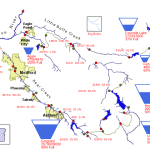Uproot Meats/Ashland: Hog Farming a Messy Business
In 2010, the Daily Tidings printed a response (thru EarthTalk) from a reader who asked: “What’s being done to clean up hog farming operations in places like Iowa and North Carolina and others where the industry is quite large? I’ve heard horrific stories about man-made ‘lagoons’ of animal waste spilling into and fouling rivers and groundwater and the like.”
Here’s the Daily Tidings response (excuse the length, but it’s informative).
“Hog farming has always been a messy business, but surging demand for pork in recent years has exacerbated an already foul problem: dealing with the continual production of the bodily waste of thousands of animals. Pigs are kept in tight quarters and their waste is channeled into huge open-air lagoon pits and sprayfields. The lagoons can rupture during heavy rains, unleashing a torrent of bacteria- and virus-laden feces and urine into nearby groundwater, lakes and streams. Likewise, sprayfields, where some farmers discard animal waste by spraying it over otherwise unused land, can pollute surrounding waterways and contaminate drinking water. Another side effect is air pollution: The lagoons and sprayfields emit methane (a leading greenhouse gas) and ammonia (a respiratory irritant) into the atmosphere, the foul odors sullying the air quality — and neighbors’ quality of life — for miles around.
“The problem has been especially bad in North Carolina, where the number of hogs raised has gone up fourfold in the last two decades — hog farmers there now raise and slaughter some 10 million hogs a year. In 1995, a hog waste lagoon overflow at Ocean View Farms in North Carolina sent 20 million gallons of hog waste into the New River, causing massive fish kills and contaminating drinking water in several neighboring communities. And the torrential rains and flooding that accompanied 1999’s Hurricane Floyd wreaked havoc on hog farm waste lagoons and surrounding ecosystems across North Carolina.
“But while hog farming has a deservedly bad reputation, that may all change thanks to farmers, activists, researchers and policymakers who are working hard to reduce the negative environmental impacts of the business and even capitalize on the waste itself. Pioneering research conducted at North Carolina State University has showed that technologies were already available to not only reduce hog waste pollution but to use it to grow crops like duckweed that can be converted into carbon-neutral, fuel-grade ethanol.
“Citing this and other research, along with public outcry over waste lagoon overflows, North Carolina lawmakers passed the Swine Farm Environmental Performance Standards Act in 2007. The landmark law makes North Carolina the first state to ban the construction or expansion of waste lagoons and sprayfields on hog farms and helps hog farmers with up to 90 percent of the costs incurred by upgrading to more sustainable waste management systems. The law also funds a swine farm methane capture pilot program that will have some 50 hog farms generating electricity from their animals’ emissions by September 2010. Time will tell whether North Carolina’s trailblazing on the issue will influence lawmakers elsewhere.”
I can’t help thinking of the proposed pig farm in Ashland, on a steep slope bordering on Ashland Canal, with no satisfactory plans or permits for handling the pig waste, orchestrated by owners with little experience in hog farming. (Oregon has no laws banning the construction or expansion of waste lagoons and sprayfields on hog farms.)
Of course, there’s a huge difference between the modest number of pigs at Uproot, compared to large hog farms. Nonetheless, the issues are the same, even with a small footprint like Uproot’s: water contamination (in this case the Ashland Canal 125 feet from the pens) and air quality in adjacent properties from spraying (as Uproot intends to do).
Barbara Cervone, Ashland
Postscript
Thank you for the discussion sparked by my recent post.
I wanted to add two items, underscoring that regardless of whether the farm is small, organic, and sustainable, the large issues of waste disposal remain.
Uproot does not have an approved septic to handle waste. They have an average of 32 pigs currently, each producing an average of 11 pounds of manure daily which translates into about 107 tons of pig poop annually. The DEQ allows no more than 20 tons of pig poop to be composted annually without a permit.
A 12/20/18 visit by the DOA notes: “We then walked upslope to the southwest for DEQ to view previous areas of concern related to the roads and construction related to the previous cannabis area. As we walked observed that there is a manure/compost pile on the south side of the chicken house. The pile was uncovered. The pile is approximately 150 feet upslope of the TID canal. I visually estimated the size of the pile to be 15 feet by 15 feet by 4 feet tall… combination manure from the pigs and chickens… I explained that the concerns … I explained that the concerns were related to the area below the chicken house and run area and the areas with pigs upslope of the TID canal… There was surface runoff flowing downslope along both sides of the driveway. While on site, this runoff was not reaching the TID canal, but during heavier rains it is likely that it does.”
Noted at a site visit on 12/18/18: “Uproot is slaughtering now and producing 25-50 gallons of water that is poured into the ground surface. DEQ informed them that “they should not dispose of wastewater in this manner.”









